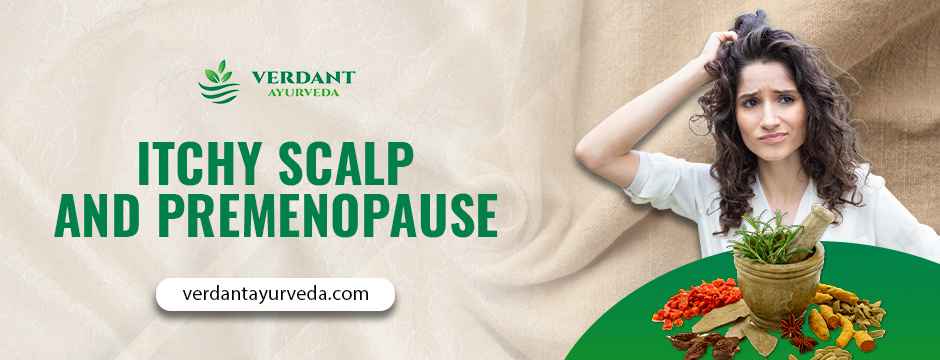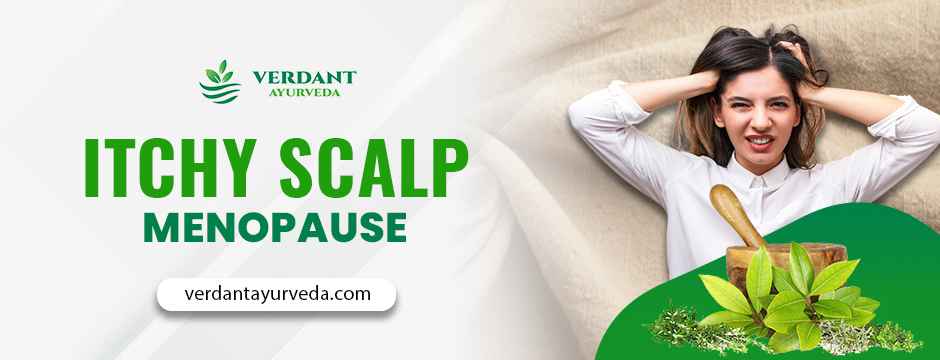
Perimenopause is a transitional phase that brings a host of hormonal changes, affecting women in their late 30s to early 50s. One of the lesser-discussed yet highly irritating symptoms of perimenopause is an itchy scalp. Fluctuating estrogen levels can lead to dryness, increased sensitivity, and even hair thinning, making scalp discomfort a common complaint. While over-the-counter treatments and medicated shampoos may offer temporary relief, many women prefer natural remedies to address the root cause of their itchy scalp.
Thankfully, Ayurveda and holistic wellness practices provide effective, time-tested solutions to soothe the scalp naturally. By focusing on hydration, nourishment, and hormone balance, these remedies not only relieve discomfort but also support overall well-being. In this article, we’ll explore the best natural treatments for Itchy Scalp and Perimenopause, from herbal oils and DIY masks to diet and lifestyle changes.
Causes of Itchy Scalp During Perimenopause

Understanding the underlying causes of an Itchy scalp menopause can help in finding the most suitable remedy. Some of the primary triggers include:
- Hormonal Fluctuations – Estrogen levels drop during perimenopause, leading to decreased sebum production, which causes dryness and irritation.
- Dehydration – Inadequate water intake can make the skin, including the scalp, dry and flaky.
- Increased Sensitivity – The scalp may become more sensitive to hair products and environmental factors.
- Stress and Anxiety – Heightened stress levels can lead to scalp tension and exacerbate itchiness.
- Nutrient Deficiencies – A lack of essential vitamins and minerals, such as biotin, zinc, and omega-3 fatty acids, can contribute to scalp dryness.
- Weather Conditions – Cold, dry weather can strip the scalp of moisture, while excessive heat and humidity can increase sweat and irritation.
- Chemical-Based Hair Products – Sulfates, parabens, and artificial fragrances in shampoos and conditioners can trigger scalp sensitivity.
Natural Remedies for Itchy Scalp
Scalp Massage with Herbal Oils
Massaging the scalp with nourishing oils improves blood circulation and provides deep hydration. Some of the best oils for an itchy scalp include:
- Coconut Oil – Has antifungal properties and deeply moisturizes the scalp.
- Almond Oil – Rich in vitamin E, it soothes inflammation and reduces dryness.
- Neem Oil – An Ayurvedic powerhouse known for its antibacterial and antifungal benefits.
- Amla Oil – Strengthens hair follicles and cools the scalp.
- Rosemary Oil: Rosemary oil enhances scalp massage by promoting hair growth, improving circulation, and reducing dandruff for healthier, stronger hair.
How to use: Warm the oil slightly and massage it into your scalp using circular motions. Leave it on for at least an hour or overnight before washing it out with a mild herbal shampoo.
Aloe Vera Gel
Aloe vera is a natural hydrator that provides instant relief from Itchy Scalp and Perimenopause. Its cooling properties help reduce inflammation while promoting scalp health.
How to use: Apply fresh aloe vera gel directly to the scalp, leave it for 20–30 minutes, then rinse with lukewarm water. Repeat this 2–3 times a week for best results.
Apple Cider Vinegar Rinse
Apple cider vinegar (ACV) balances the scalp’s pH, reducing dryness and flakiness. It also has antimicrobial properties that help combat fungal infections.
How to use: Mix equal parts of ACV and water, apply it to the scalp after shampooing, let it sit for a few minutes, and then rinse. Avoid using this rinse too frequently, as excessive use can lead to dryness.
DIY Yogurt and Honey Mask
Yoghurt contains probiotics that help maintain scalp health, while honey acts as a natural humectant, locking in moisture.
Recipe:
- 2 tablespoons plain yogurt
- 1 tablespoon raw honey
- 1 teaspoon olive oil
Mix the ingredients and apply the mask to your scalp. This mask not only soothes an itchy scalp but also strengthens hair.
Hydration and Herbal Teas
Drinking enough water and consuming herbal teas can help maintain scalp hydration from within. Herbal teas such as chamomile, peppermint, and spearmint support hormonal balance and reduce inflammation.
Additionally, drinking plenty of water throughout the day ensures that the scalp remains hydrated and less prone to dryness and irritation.
Dietary Adjustments
Including nutrient-dense foods in your diet can significantly improve scalp health. Consider incorporating:
- Omega-3-rich foods like flaxseeds, walnuts, and fatty fish
- Zinc-rich foods like pumpkin seeds and lentils
- Iron-rich foods such as leafy greens, beans, and tofu, as iron deficiency can contribute to hair and scalp issues.
Reduce Stress Through Ayurveda
Chronic stress can exacerbate scalp issues. Practising mindfulness, yoga, and Ayurvedic breathing techniques (pranayama) can help balance hormones and improve scalp health.
Additional stress-reducing techniques:
- Meditation for at least 10 minutes a day
- Practicing gratitude journaling
- Gentle stretching or restorative yoga to relieve tension
Gentle Hair Care Routine
A mild and natural hair care routine can help minimize scalp irritation. Opt for sulfate-free shampoos and herbal conditioners that contain ingredients like neem, hibiscus, and Brahmi. Avoid over-washing your hair, as excessive cleansing can strip natural oils and worsen dryness.
Scalp Exfoliation
Just like facial skin, the scalp benefits from gentle exfoliation to remove dead skin cells and product buildup.
DIY Scalp Scrub:
- 2 tablespoons brown sugar
- 1 tablespoon coconut oil
- 1 teaspoon lemon juice
Mix the ingredients and gently massage the scrub onto your scalp before washing your hair. This helps improve circulation and removes flakes.
End Thoughts
Perimenopause can bring about many unwelcome changes, including an itchy scalp, but natural remedies offer safe and effective solutions. Incorporating Ayurvedic oils, herbal treatments, and lifestyle adjustments can provide long-term relief and promote overall well-being in Itchy Scalp and Perimenopause. With consistent care and a holistic approach, you can maintain a healthy, nourished scalp throughout perimenopause and beyond.
For premium Ayurvedic solutions crafted with natural ingredients, explore Verdant Ayurveda and discover the best products to nourish your scalp and hair naturally. Our ayurvedic therapies are more effective if you take them according to your body’s constitution.
